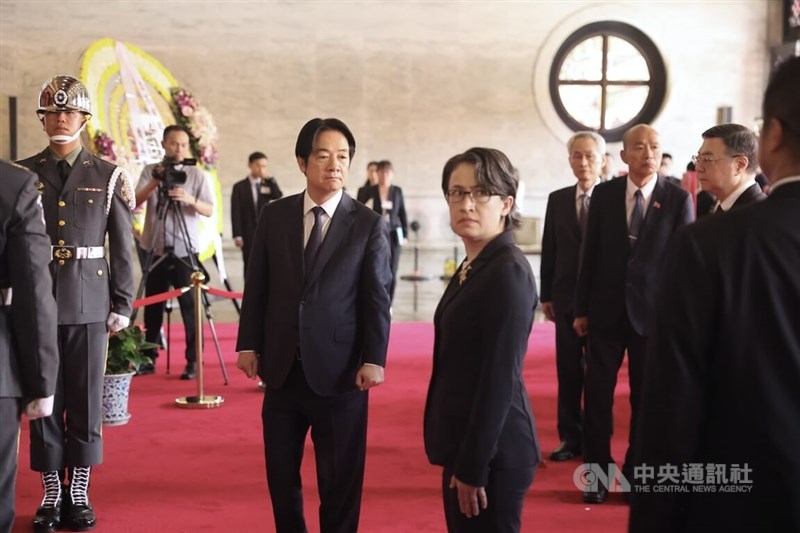
Taipei, Sept. 3 (CNA) President Lai Ching-te (賴清德) on Wednesday called on countries to uphold peace and promote freedom and democracy as Taiwan marked the 80th anniversary of the end of World War II and the Second Sino-Japanese War.
In a Facebook post after presiding over a memorial ceremony at the National Revolutionary Martyrs' Shrine in Taipei, Lai said he and Vice President Hsiao Bi-khim (蕭美琴), along with senior officials, honored those who sacrificed their lives in major battles.
"Taiwanese people are peace-loving. Taiwan does not believe in commemorating peace by holding guns," Lai wrote, contrasting his remarks with Beijing's military parade the same day. "We remember these martyrs and the lessons from history, and continue to safeguard our beliefs in freedom and democracy. We believe guns in our hands are to protect our country and home, not to be used for invasion or expansion."
Lai recalled that on Sept. 2, 1945, Republic of China (ROC) General Hsu Yung-chang (徐永昌) signed the Instrument of Surrender with other Allies, bringing the war to an end. He noted that Japan, Germany and Italy have since become democratic countries that uphold human rights and the rule of law.
"I sincerely hope countries that once suffered invasion can work together to safeguard peace and make freedom and democracy the cornerstones of stability and prosperity," he said.
Lai also warned against the resurgence of fascism, which he described as characterized by "extreme nationalism," censorship and leader worship. His comments referenced Beijing's official title for its military parade: "The 80th anniversary of the victory in the War against Japanese Aggression and the World Anti-Fascist War."
Chinese President Xi Jinping (習近平) presided over the event in Beijing, joined by Russian President Vladimir Putin, North Korean leader Kim Jong-un and Iranian President Masoud Pezeshkian.
The Second Sino-Japanese War was fought between the ROC, then based in China, and the Empire of Japan from 1937 to 1945. The conflict is widely regarded as part of World War II and as the starting point of the war in Asia.
The ROC government, led by Kuomintang leader Chiang Kai-shek (蔣中正), relocated to Taiwan in 1949 after losing a civil war to Mao Zedong's (毛澤東) Communists, who established the People's Republic of China (PRC) in Beijing that year.
Taiwan has long argued that the ROC played the central role in resisting Japan, while Beijing claims credit through commemorative events such as Wednesday's parade.
-
Society
Phone, text scam attempts fall 36.97% year-on-year in Taiwan
02/24/2026 09:07 PM -
Science & Tech
Google to launch budget Pixel 10a in Taiwan March 5
02/24/2026 08:55 PM -
Society
Free COVID vaccination extended to April 30 ahead of possible surge: CDC
02/24/2026 08:29 PM -
Business
TSMC accounts for over 10% of Taiex turnover Tuesday
02/24/2026 08:22 PM -
Society
4 pygmy killer whales die after mass stranding in Pingtung
02/24/2026 07:21 PM